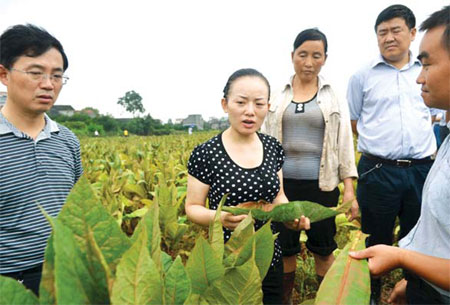|
||||
|
|
||||
Quality of local life on the rise
By Feng Zhiwei ( China Daily )
Updated: 2012-11-10
|
Huaihua Mayor Li Hui (second left) pays a visit to a rural area of Wuling Mountain. She plans to better protect local resources as the city strives to reduce poverty. |
Whether they are from the city or the countryside, residents of Hunan are reaping the benefits of the province's drive to create a greener economy through a renewed emphasis on such eco-friendly industries as tourism and cultural products, provincial officials said.
Since Hunan's capital Changsha and two other cities were approved as pilot areas for an ecology and resource conservation initiative in 2007, Hunan has released a series of policies to encourage rapid development in cultural industries and other green enterprises.
The revenue of cultural and creative industries reached 100 billion yuan ($16.1 billion) in 2011, increasing its contribution to the provincial GDP to 8 percent, which is the highest rate among provinces in Central China.
The growing strength of the provincial economy is greatly improving quality of life in urban and rural areas. For example, the local government in Zhuzhou has re-invested growing revenues into more public rental bicycles, which are popular among locals.
More than 20,000 bicycles have been put into service since the public bicycle rental system started in May 2011. Residents with a smart card can borrow one from any one of the 1,000 docking stations in the city and use it for free during the first three hours.
These public bicycles have become an increasingly important part of urban transportation in Zhuzhou.
In some rural areas, a specialty tourist industry has been developed based on local natural scenery and customs. Guanshan village near Changsha has had an extraordinary change of fortunes thanks to this trend.
Xiang Xiaguang, a female villager said: "We used to be very poor, relying on growing rice, so no one could afford for a car. But I can earn at least 260,000 yuan a year from the rise of agricultural tourism." The work and fat profits attracted her young son back home from Guangzhou.
Agricultural tourism is based on a farm, and it includes family-style activities, such as pick-your-own vegetables and fruits, which is very popular among urban residents who want to get their hands dirty on weekends.
In 2011, more than 200,000 tourists came to this village, bringing total revenue worth 337 million yuan, and the per capita income of the villagers also grew to 15,400 yuan.
A twin focus on developing the economy and protecting the environment is fueling growth in traditional rural areas. Fishermen, many of whom live in boats on Dongting Lake, are gradually moving to new homes.
"We didn't pay any money for our house, because the government gave us the subsidies," said a 78-year-old man who lived on a boat for more than 20 years and was forced to escape to the hills when floods came.
The province has implemented policies to guarantee people improve their quality of life through many ways, including tourism.
"We pursue sustainable development, then make an effort to create harmony between man and nature. But we also try our best to improve people's quality of life. The two parts are both key focuses during work," said Hunan Governor Xu Shousheng.
fengzhiwei@chinadaily.com.cn
(China Daily 11/10/2012 page8)

